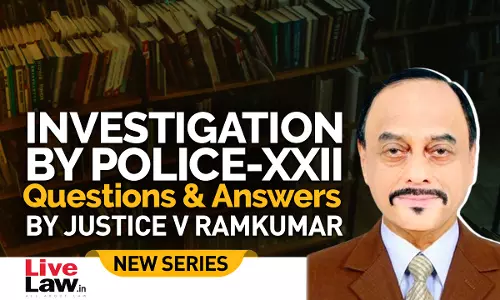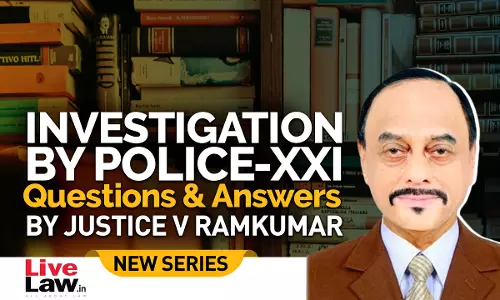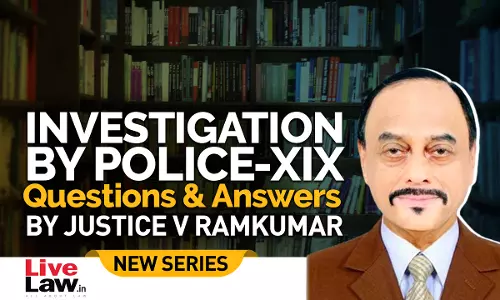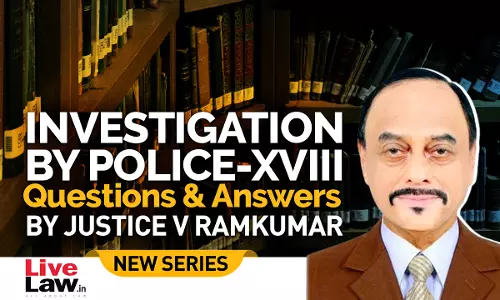Law Exam Updates in India: Schedules, Key Announcements
[BAIL] Questions & Answers By Justice V. Ramkumar-Regular Bail-PART-VII
Q.31 Is an Officer-in-charge of a Police station empowered to grant bail in a non-bailable offence under Section 437 Cr.P.C.?Ans. Yes. Except in the cases covered by Clauses (i) and (ii) of Section 437 (1) Cr.P.C. the SHO also can grant bail in a non-bailable offence. (Vide Section 437(1), (2) and (4).Q.32 Is not an officer-in-charge of a Police station also empowered to grant bail...
Questions & Answers By Justice V. Ramkumar- Investigation By Police- PART XXV
Q.121 When does trial start in a “warrant case” and a “sessions case”?Ans.· The following are the provisions in the Cr.P.C. pertaining to the framing of charge in warrant and sessions trial:-Warrant - Sec. 240 (police charge case)- Sec. 246 (complaint case)Sessions - Sec. 228· In paragraph 28 of Ratilal Bhanji Mithani v. State of Maharashtra – (1979) 2 SCC 179 = AIR 1979 SC...
[BAIL] Questions & Answers By Justice V. Ramkumar-Regular Bail-PART-VI
Q.26 Is the requirement in the bail order and in the bail bond in a bailable offence that the accused should attend the court at the time and place specified therein, a bail condition ?Ans. A reading of Section 436(2) Cr.P.C. would indicate that it is a condition. But in Azeez v. State 1984 KLT 437 – U. L. Bhat – J, it has been held that it is only a term as to bail. If there is...
Questions & Answers By Justice V. Ramkumar- Investigation By Police- PART XXIV
Q.116 What is the procedure to be followed by the Court for summary trial of an offence ?Ans. The procedure for summary trial is the same procedure to be resorted to for Summons trial with the following changes :-a) Magistrate can resort to summary procedures for Trial in respect of the 9 categories of offences enumerated under Section 260 (1) Cr.P.C.b) A Special Summons in Form 30 of the...
[BAIL] Questions & Answers By Justice V. Ramkumar-Regular Bail-PART-V
Q.21 “Even though the principles of res judicata are not applicable to bail applications, it would lead to bad precedent if bail applications are filed repeatedly or successively without there being any change of circumstances”. Do you agree with the above proposition?Ans. Yes. Those are the observations made by the Supreme Court in State of Tamil Nadu v. S.A. Raja AIR 2005 SC 4462 – K....
Questions & Answers By Justice V. Ramkumar- Investigation By Police- PART XXIII
In the case of “petty offences” is there any “special summons” and what are the options available to the accused ?Ans. Yes. In the case of “petty offences” as defined under Section 206 (2) Cr.P.C. and which can be summarily disposed of under Sections 260 or 261 Cr.P.C., the Magistrate can issue a “special summons” indicating the amount of fine not exceeding Rs. 1,000/- in...
[BAIL] Questions & Answers By Justice V. Ramkumar-Regular Bail-PART-IV
Q.16 Is there any exception to the rule that the Magistrate who is competent to try the case or commit the case alone can grant bail ?Ans. Yes. Where a warrant is issued under Section 78 Cr.P.C. for execution outside the jurisdiction of the Magistrate and where the offence is non-bailable, then the CJM or the Sessions Judge within whose limit arrest has been made, can grant bail in view of...
Questions & Answers By Justice V. Ramkumar- Investigation By Police- PART XXII
Q.106 A private complaint is filed before a Court of Session alleging the commission of certain IPC offences some of which are exclusively triable by a Court of Session. It is alleged in the complaint that since one of the accused persons is a Sub Inspector of Police, the Station House Officer at the Police Station refused to entertain the complaint made to the Police. The Sessions Judge...
Questions & Answers By Justice V. Ramkumar- Investigation By Police- PART XXI
Q.101 Where, on receipt of a complaint alleging that commission of a cognizable offence, the Magistrate orders an investigation under Section 156 (3) Cr.P.C. is it not permissible for the SHO to refuse to register an FIR for the reason that he has no territorial jurisdiction to register an FIR and conduct investigation ?Ans. No. On receipt of a complaint for investigation under Section 156...
Questions & Answers By Justice V. Ramkumar- Investigation By Police- PART XX
Q.96 Taking cognizance on a “complaint”. Let us discuss 6 situations in this context.Situation 1 At 4.30 p.m a Magistrate receives a private complaint alleging the commission of cognizable offences by the named accused therein. The complainant and his witnesses are present. The Magistrate goes through the complaint and the documents produced along with it and looks up at the clock to...
Questions & Answers By Justice V. Ramkumar- Investigation By Police- PART XIX
Q.91 Is it not permissible to use the “inquest report” to contradict the prosecution witnesses to whom a dying declaration was made by the deceased ?Ans. No. Statement made by the Investigating Officer in the inquest report on the basis of what he heard from others would be hit by Section 162 Cr.P.C. (Vide para 30 of George v. State of Kerala (1998) 4 SCC 605 = AIR 1998 SC 1376 – M....
Questions & Answers By Justice V. Ramkumar- Investigation By Police- PART XVIII
Q.86 Is it not correct to say that both the “inquest report” and the “post-mortem report” are substantive evidence ? Ans. No. Both of them are not substantive evidence. (Vide— Para 6 of Munshi Prasad v. State of Bihar (2002) 1 SCC 351 = AIR 2001 SC 3031 – U. C. Banerjee, K. G. Balakrishnan - JJ; Sambhu Das v. State of Assam (2010) 10 SCC 374 = AIR 2010 SC 3300...

![[BAIL] Questions & Answers By Justice V. Ramkumar-Regular Bail-PART-VII [BAIL] Questions & Answers By Justice V. Ramkumar-Regular Bail-PART-VII](https://www-livelaw-in.demo.remotlog.com/h-upload/2023/02/02/500x300_456837-questions-answers-by-justice-v-ramkumar-regular-bail-part-vii.webp)
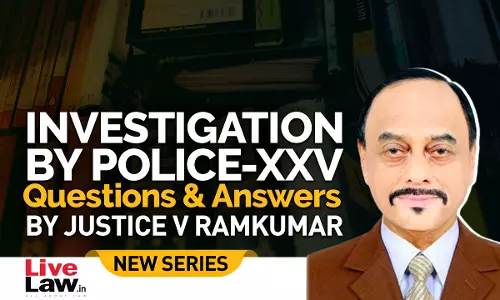
![[BAIL] Questions & Answers By Justice V. Ramkumar-Regular Bail-PART-VI [BAIL] Questions & Answers By Justice V. Ramkumar-Regular Bail-PART-VI](https://www-livelaw-in.demo.remotlog.com/h-upload/2023/01/26/500x300_455738-bail-questions-answers-by-justice-v-ramkumar-regular-bail-part-vi.webp)
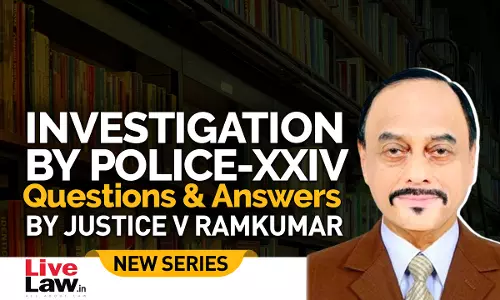
![[BAIL] Questions & Answers By Justice V. Ramkumar-Regular Bail-PART-V [BAIL] Questions & Answers By Justice V. Ramkumar-Regular Bail-PART-V](https://www-livelaw-in.demo.remotlog.com/h-upload/2023/01/21/500x300_454951-bail-questions-answers-by-justice-v-ramkumar-regular-bail-part-v.webp)
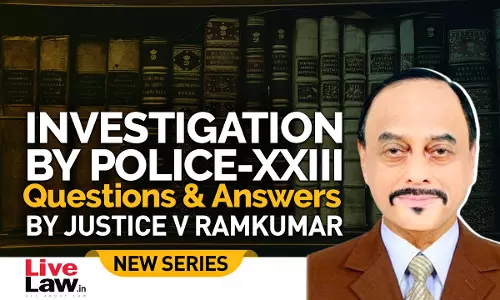
![[BAIL] Questions & Answers By Justice V. Ramkumar-Regular Bail-PART-IV [BAIL] Questions & Answers By Justice V. Ramkumar-Regular Bail-PART-IV](https://www-livelaw-in.demo.remotlog.com/h-upload/2023/01/19/500x300_454579-bail-questions-answers-by-justice-v-ramkumar-regular-bail-part-iv.webp)
